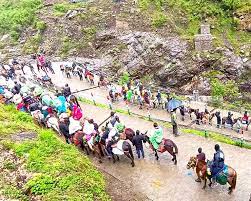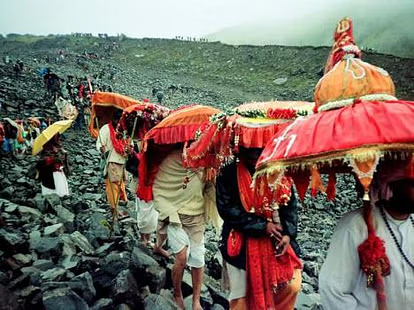Horses will also pass the test before going to Char Dham! Immediate action plan on infected animals

b
To make the Chardham Yatra safe and organized, the government has started preparations on a large scale. On the instructions of Chief Minister Pushkar Singh Dhami, the Animal Husbandry Department has expedited the process of health testing of horses and mules used in the Yatra. So far, samples of more than 5 thousand horses and mules have reached the Disease Research Laboratory located in Srinagar for examination.
Glanders and horse flu are being investigated
Let us tell you that horses and mules are the main means of transportation and carrying of goods for pilgrims in the journey of Yamunotri, Kedarnath and Hemkund Sahib. Horses and mules reach here from various places in large numbers during the journey. According to the data, every year during the Chardham Yatra, about eight thousand horses and mules come to Kedarnath Dham, three thousand to Yamunotri Dham and one thousand horses and mules come to Hemkund Sahib. In such a situation, there is a risk of infection among them.
Samples of horses and mules are being collected at the barriers
The fitness of animals is checked by the Animal Husbandry Department at major stops. A few years ago, glanders and equine influenza have been reported in horses and mules. It becomes necessary to isolate and euthanize the animal infected with glanders infection so that this infection does not spread to other animals. In view of this, on the instructions of the government, the Animal Husbandry Department is collecting blood samples of horses and mules at barriers established at various places.
Samples sent to Srinagar for testing
The samples collected by the Animal Husbandry Department are being sent to the Disease Research Laboratory in Srinagar for testing. Dr. Bhupendra Jangpangi, Additional Director of Animal Husbandry Department Garhwal, said that in view of the Chardham Yatra, serum samples are being tested on a war footing in the lab. For cooperation, two experts from NRCE are assisting in the investigation. Samples are coming to the lab from Bageshwar, Chamoli, Rudraprayag, Pauri, Tehri, Uttarkashi and Dehradun and other districts.
If glanders is confirmed, the animal will be euthanized
Dr. Jangpangi said that 5,662 samples have come to the lab for testing. Out of these, 3,392 samples have been tested. If any sample turns out to be suspected infected, then a repeat sample will be sent to NREC for confirmation. He said that if any glanders is confirmed again, then it will have to be euthanized. On the other hand, if EI infection is found, the sick animal will be separated from others (quarantined). After 14 days, the animal will be examined, if it is healthy, it will be registered for the journey.







